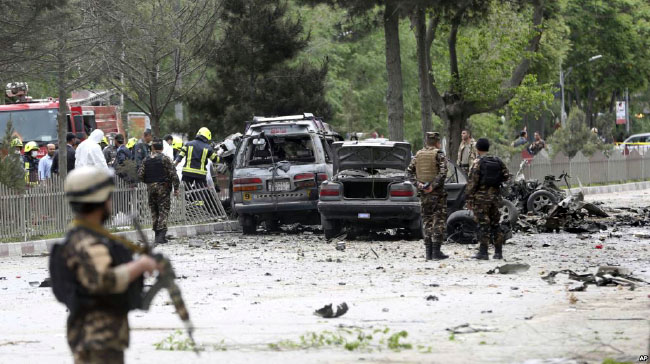The widespread violence in Afghanistan fills the air with a sense of disappointment. The graph of casualty remains high and there is no remedy for the bleeding wound of Afghan nation. The deadly game of terrorist networks, supported by mysterious hand, never comes to an end. Afghans’ sufferings continue unabated. Life is indescribably cheap and human rights are flagrantly violated as a result of war. More than a decade has passed from the conflict; however, the main reason behind this fighting still remains a mystery.
There are three main reasons regarding the war carried out by the militants: First, it is believed that warring parties are constituted of a number of ideologues. Their ideology tends to be very violent for rooting in fundamentalism. For instance, some warring parties, mainly the Taliban, claimed to establish the divine rule on the surface of earth. According to them, Muslims have deviated from the right path and non-Muslims are already infidels. Therefore, shedding the blood of both the groups would be allowed. On the other hand, political figures claim that ideology – which is tinged with harsh and burning emotions and revolutionary spirit – will cool down and its revolutionary nature will change into institution with the passage of time. But this fact has not been proved with the militants’ ideology. They seek to tailor people’s beliefs and religious attitudes, from all walks of life, according to their own beliefs and warped minds – this is not possible and the only choice left for the militants will be killing any groups. Second, it is believed that a number of individuals join militants so as to alleviate their financial pressure. This group does not care about ideology but paid to fight (mercenary fighters) and which is why the bulk of militants are formed by villagers who are deprived of social welfare. Third, some adventurous people, such as cowboys, show tendency towards militancy for no reason other than adventure – perhaps they are the most dangerous group and nothing – including moral values, religious beliefs, human’s life and dignity – will be sacred for them. It is most likely that almost all warring parties, including the Taliban, are constituted of all these three groups.
However, it is hard to figure out which of the three said groups will form the bulk of the Taliban’s outfit. It seems that the Taliban do not fight for faith and beliefs. For instance, the clergy and great clerics called the Taliban’s war illegitimate from religious perspective and constantly condemned their acts. The Taliban fighters kill men, women and children indiscriminately, which is a big sin in Islam. The Ulema’s fatwa did not bear the desired result. To one’s unmitigated chagrin, clerics are also targeted by the Taliban. Recently, Afghan President Muhammad Ashraf Ghani called the clergy to facilitate peace talks, but this will not work out either. Perhaps, only the ideologues who claim to fight for protecting religious beliefs will show a little tendency towards the clergy’s peace offering not the mercenary and adventuresome fighters. Now the question – which has remained unanswered for more than a decade – is that what is the concrete solution to this problem?
It is beyond doubt that both counterinsurgency and peace process came to stalemate and no one could break the deadlock. The Taliban capitalized on the peace negotiation as some of their prisoners were released during Hamid Karzai’s administration. Karzai showed great patience towards them calling them “discontented brothers” but they never acceded to the call for peace.
I agree with the maxim “if you want peace, prepare for war”. The strategy of war should be changed in Afghanistan, however. Most probably, if people are not involved in supporting the soldiers, the same trend will continue. In other words, tribal elders and residents must report the weakness of the militants and give information to the government about the fighters’ havens and strongholds. Since locals are more aware about the war zone and number of fighters in their areas, they will have to provide all the necessary information to soldiers. It is the people’s responsibility to help the government so as to have their own rights and freedoms protected.
In addition, the government must strengthen the intelligence. The deadly attacks in Sardar Daud Khan’s Hospital in Kabul and in Mazar-e-Sharif could be foiled if Afghanistan had strong intelligence service. Furthermore, the state will have to reinforce the border security. A porous border will certainly constitute a serious threat to citizens’ life. Last but not the least is eradicating the poppy cultivation. The government must find out the farmers and land-owners who cultivate opium and prosecute them fairly since the Taliban are benefitted from their cultivation.
To sum up, warring factions will not hold negotiation with Afghan government which has been proved within last years. Continuing the war on terror seems to be the only choice before the government. When a mechanism fails to bear the desired result, the government should change the war strategy with the support of Afghan and foreign generals. The aforementioned suggestions will work out if they are applied strictly. So, peace will be provided if a country is strong not only militarily but from different aspects.
Home » Opinion » Solution to Insurgency
Solution to Insurgency
| Hujjatullah Zia

